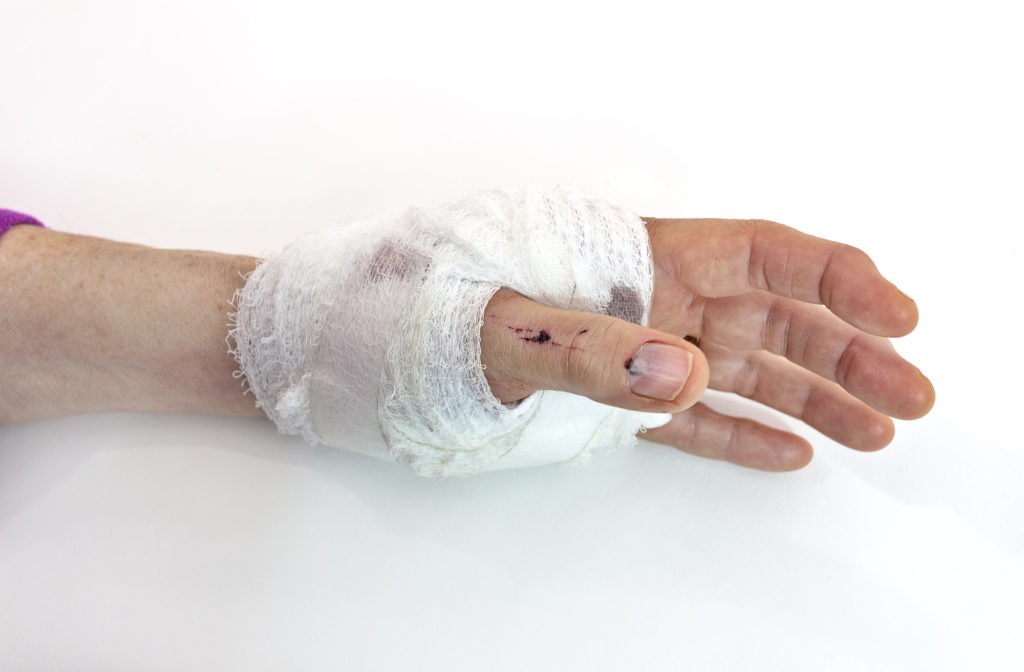
Dogs are delightful companions. They’re smart, loyal, and kind.
And sometimes they bite.
It may be due to a lack of training, or they may be scared or hurt. Or they may just be young. Puppies tend to nip while teething.
If you have a dog bite injury, there are five important things to do to make sure you are safe, the wound heals properly, and that your medical costs are covered.
Read on to find out what to do if a dog bites you.
1. Treat the Wound
If a dog has bitten you or a loved one, the first step is to get to a safe, secure place.
For a superficial dog bite, start by cleaning the wound with soap and water. Follow the cleaning with treatment with hydrogen peroxide or isopropyl alcohol. Treat the wound with an antibiotic ointment and cover it with a bandage.
For a deeper puncture wound, the best course of action depends on the location of the wound. Head and neck wounds should receive emergency treatment. Call 911 if there is a puncture wound in either of these areas.
If the wound is elsewhere, let it bleed for five minutes. Although this can be scary, the blood flow can clean the wound. After five minutes, apply pressure. If the blood flow continues with pressure, seek emergency treatment.
If the blood flow stops, clean the wound by rinsing it for five minutes along with washing it with a mild soap. Don’t use rubbing alcohol or hydrogen peroxide on a puncture wound. You can leave the wound exposed or cover it with a bandage.
Monitor the bite for any redness or swelling.
2. See a Doctor for Dog Bite Injury Treatment
Even if the wound doesn’t seem serious, it’s important to seek medical attention for the wound. Dog bites put you or your loved one at risk for infection.
Even if you know how to treat a dog bite and do all the right things, it is still worthwhile to see a doctor.
The doctor will examine the wound and collect information on how the bite occurred. Your doctor may also clean the wound again and may prescribe antibiotics.
If you or your loved one hasn’t had a recent tetanus booster, your doctor may want to administer that as well. A deep wound may also require stitches.
3. Exchange and Gather Information
A dog bite can be a frightening experience. An accidental dog bite can be stressful for the dog owners as well as the person that the dog bit.
If you have the presence of mind at the scene of the incident, it’s important to exchange information with the dog owners. If you can’t do it immediately, you should follow up with the owners as soon as you can.
You should exchange contact information, including the name of the owners, their address, and their phone number.
You should also confirm whether or not their dog has had a recent rabies vaccination. Get a copy of their rabies confirmation paperwork and confirm the validity of the paperwork with their veterinarian. Given the seriousness of a rabies infection, it’s important to know whether or not you are at risk.
If the dog was feral, it’s even more important to get medical treatment to prevent a rabies infection.
If anyone else saw the bite incident, get their contact information as well. They can provide vital information if you need to file an insurance claim or if you need to file a lawsuit.
As your dog bite is treated, it’s important to document each step along the way. Take pictures of the bite, and make sure you get a copy of any medical records related to the bite. Save all the bills and receipts for treatment.
If you need to miss work, keep a record of that time as well.
4. File Reports
Even in the case of a small dog bite, it’s important to file a report with your local animal control agency. This also provides further documentation of the incident. You may want to file a police report as well.
This is especially important if the dog was feral. Animal control will need to capture the dog, and you’ll need to seek rabies treatment.
If it’s your own dog, you don’t need to file a report. You may want to consider consulting an animal trainer to help correct your dog’s behavior and prevent future bites, though.
5. Consult an Attorney
If you’re unable to reach an understanding with the dog’s owners regarding treatment, you may want to consult an attorney. Dog bites are a frequent occurrence, and attorneys are familiar with the dog bite laws in your state and local area.
For example, some states will hold the owners accountable for any dog bite, while some states allow one bite to occur if the dog hasn’t shown any signs of aggressive behavior before. Some states also allow exceptions if the dog bit someone because that person provoked the dog.
If you are dealing with medical treatment costs or missed work due to the dog bite, you may be able to seek compensation. An attorney can also help you get payment from the dog owner’s insurance company for medical bills. They may also be able to recover compensation for your pain and suffering.
Consider taking the time to read more about how an attorney can help with your situation.
Moving On
Recovering from a dog bite injury can take time. If the bite was from your own dog, it can take time to rebuild your relationship with your pet.
If the bite was from a strange dog, you might be hesitant to be around dogs again. That’s understandable.
You may also want to seek counseling to help you in your recovery process. A professional can help you develop ways to cope with your trauma and resume your normal activities.
Our website also offers useful and entertaining articles that can help you in your recovery. We have everything from tips for reducing anxiety to the latest celebrity news. Take your mind off your troubles with an article or two, and don’t forget to leave a comment!

